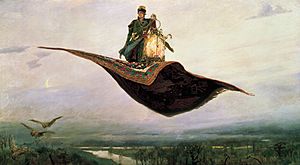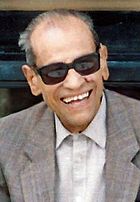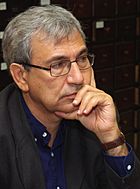Islamic literature facts for kids
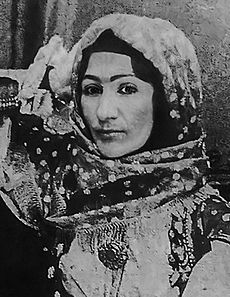
Islamic literature is writing created by Muslim people, or writing that shows an Islamic cultural viewpoint. It can be written in any language and come from any country or region. This literature includes many types of writing, like stories, poems, and helpful advice.
Contents
Amazing Stories and Novels
Famous Fiction from the Islamic World
One of the most famous story collections from the Islamic world is One Thousand and One Nights, also known as Arabian Nights. This book is a collection of old folk tales. They are all told within a main story where a Persian Queen named Scheherazade tells a new tale each night.
This collection of stories became popular around the 10th century. It reached its final form by the 14th century. The number and types of stories in the book have changed over time. Many other Arabian fantasy stories were also called "Arabian Nights" when translated into English. This happened even if they were not part of the original collection.
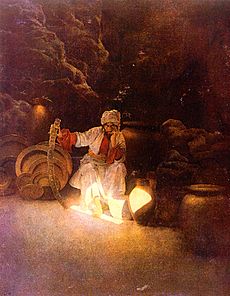
The Book of One Thousand and One Nights has been very important in the Western world. It was first translated into French in the 1700s by Antoine Galland. Many writers, especially in France, tried to create similar stories.
Early Philosophical Novels
In the 12th century, two thinkers named Ibn Tufail (also called Abubacer) and Ibn al-Nafis wrote some of the first philosophical novels. A philosophical novel explores big ideas about life and knowledge.
Ibn Tufail wrote the first Arabic novel, Hayy ibn Yaqdhan. This title means The Self-Taught Philosopher. It was written to respond to another book called The Incoherence of the Philosophers. Later, Ibn al-Nafis wrote his novel Theologus Autodidactus, or The Self-Taught Theologian, as a response to Ibn Tufail's work.
The main characters in both these stories were children who grew up alone on a desert island. They learned everything by themselves. These books are some of the earliest examples of a "desert island story." In Hayy ibn Yaqdhan, the character Hayy lives alone with animals. But in Theologus Autodidactus, the character Kamil's story goes beyond the island. It becomes one of the first "coming of age" stories, where a character grows up and learns about the world. It is also considered an early example of a science fiction novel.
Philosophus Autodidactus was translated into Latin in 1671. Later, it was translated into English, German, and Dutch. These translations inspired Daniel Defoe to write Robinson Crusoe. This book is often called the first novel written in English. The story also influenced Robert Boyle to write his own philosophical novel set on an island. The ideas in Philosophus Autodidactus also remind us of Jean-Jacques Rousseau's Emile. It also shares similarities with Mowgli's story in Rudyard Kipling's The Jungle Book and Tarzan by Edgar Rice Burroughs. In these stories, a baby is left alone but is cared for by animals.
The Beauty of Poetry
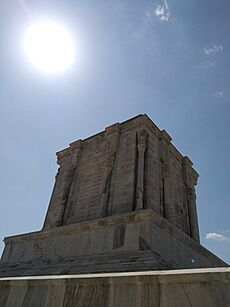
Sufi poetry is a type of devotional poetry. It is known for expressing deep spiritual feelings. Arab poetry has influenced Muslim poetry all over the world. Similarly, Persian poetry has also spread its influence beyond Iran, especially in South Asian languages like Urdu and Bengali.
Classical Persian poetry has different forms. The most common is the ghazal. This is a short love poem with seven to twelve verses. It follows a special rhyming pattern. Urdu poetry is also very rich. It has many different types of poems and is known for live public performances. These include Mushairas, Qawwali, and Ghazal singing.
Ferdowsi's Shahnameh (The Book of Kings) is the national epic poem of Iran. It tells a mythical and heroic version of Persian history. Amir Arsalan was another popular mythical Persian story. It has inspired some modern fantasy stories, like The Heroic Legend of Arslan.
Starting in the 15th century, Bengali poetry began to explore themes like inner struggles, Islamic cosmology (the Muslim view of the universe), historical battles, and love. Important works by Shah Muhammad Sagir, Alaol, Abdul Hakim, Syed Sultan, and Daulat Qazi mixed Bengali folk poetry with stories and ideas from Persia and Arabia. These works are a key part of Muslim culture in Bengal. Ginans are special hymns or poems sung by Shia Ismaili Muslims.
Dante Alighieri's Divine Comedy is a famous epic poem from Italian literature. It got many ideas about the afterlife from Arabic works on Islamic eschatology (the Muslim beliefs about the end of the world and what happens after death). These ideas came from the Hadith (sayings and actions of Prophet Muhammad) and the Kitab al-Miraj (a book about Muhammad's journey to Heaven). They also came from the spiritual writings of Ibn Arabi.
Medieval Adab Works
The word adab used to mean all the knowledge a cultured person needed to have to be considered polite and refined in society. It started with the idea that adab was about having good manners and morals. So, adab can also mean rules of etiquette in Islamic law or even a greeting gesture.
According to Issa J. Boullata, adab writings grew in Arabia even before Islam. Most of it was passed down by word of mouth. After Islam arrived, it continued to grow and became more varied. Slowly, these writings were collected into books. They also included stories and sayings from the Bible, the Qur’ān, and the Ḥadīth (sayings of Prophet Muhammad). As the Arabic language spread with the growth of Islam, adab also included material from Persian, Sanskrit, Greek, and other languages.
Eventually, there was so much adab material that scholars had to choose the most important parts. They made selections for different readers, such as students who wanted to learn and become cultured. They also made selections for people working in the Islamic state, like advisors, judges, and government secretaries, who needed useful knowledge.
Some important early adab collections include:
- al-Mufaḍḍaliyyāt by Al-Mufaḍḍal al-Ḍabbī (died around 780 CE)
- Dīwān al-Ḥamāsa by Abū Tammām (died 846 CE)
- ʿUyūn al-Akhbār by Ibn Qutayba (died 889 CE)
- al-ʿIqd al-Farīd by Ibn ʿAbd Rabbih (died 940 CE)
Literary Awards and Prizes
Booker Prize Winners
Salman Rushdie (born 1947) is a British Indian novelist. His second novel, Midnight's Children, won the Booker Prize in 1981. This book was even called "the best novel of all winners" twice! Rushdie has said he was "shaped by Muslim culture more than any other."
Jokha Alharthi (born 1978) from Oman was the first Arabic-language writer to win the Man Booker International Prize in 2019. Her novel, "Celestial Bodies," tells the story of three Omani sisters and explores the history of slavery in her country.
Nobel Prize in Literature
In 1988, the Nobel Prize in Literature was given to the Egyptian author Naguib Mahfouz (1911–2006). He was honored for his works that were both realistic and sometimes mysterious. His writing created an "Arabian narrative art that applies to all mankind." He was the first Muslim author to receive this important award. Mahfouz described himself as "a pious Muslim believer."
The 2006 Nobel Prize in Literature was awarded to the Turkish author Orhan Pamuk (born 1952). He is famous for his novels My Name Is Red and Snow. He was recognized for exploring the "melancholic soul of his native city" and finding "new symbols for the clash and interlacing of cultures." Pamuk was the first Turk to win the Nobel Prize. He describes himself as a "Cultural Muslim." This means he connects with the historical and cultural parts of the religion, even if he doesn't believe in a personal connection to God.
International Prize for Arabic Fiction
The International Prize for Arabic Fiction is a literary award for Arabic authors. It is managed with the Booker Prize Foundation in London. The winner receives US$50,000, and the six shortlisted authors each get US$10,000. The goal of this award is to celebrate excellent modern Arabic fiction. It also aims to encourage more people to read good Arabic literature both in the region and around the world. The prize also helps get Arabic books translated into other major languages.
King Faisal Prize
The King Faisal Prize is an annual award given by the King Faisal Foundation. It honors "dedicated men and women whose contributions make a positive difference." The foundation gives prizes in five areas: Service to Islam; Islamic studies; the Arabic language and Arabic literature; science; and medicine. Three of these prizes are considered some of the most respected awards in the Muslim world.
 | Tommie Smith |
 | Simone Manuel |
 | Shani Davis |
 | Simone Biles |
 | Alice Coachman |


